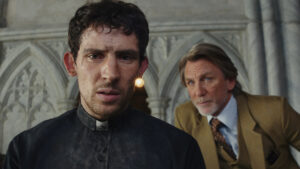On My Shelf helps you get to know various writers through a behind-the-scenes glimpse into their lives as readers.
I asked Joel Beeke—president and professor of systematic theology and homiletics at Puritan Reformed Theological Seminary, and a pastor of the Heritage Netherlands Reformed Congregation in Grand Rapids, Michigan—about what’s on his nightstand, his favorite biographies, his favorite Puritan work, and more.
What’s on your nightstand right now? 
My nightstand is always overflowing. The Reformation Heritage KJV Study Bible is there, of course. My wife and I read it together every day—including the family worship sections at the end of each chapter.
Samuel Rutherford’s Letters has been there for more than 20 years; Valley of Vision, a Puritan collection of poetry, has been there for 10 years. I read these books especially if I’m feeling a bit discouraged, as they are pick-me-uppers.
Then, presently, there’s Shawn Wright’s Theodore Beza, as well as an old copy of Beza’s own book on The Song of Solomon (only the first three chapters)—published in English in 1587, 18 years before he died.
There’s also an out-of-print manuscript by John Calvin on suffering, and a doctoral dissertation by Eric Rivera, ‘From Blackfriars to Heaven’: The Puritan Practical Divinity of William Gouge.
Then there are about 10 manuscripts by contemporary writers I have to review in the next two weeks to determine whether Reformation Heritage Books should publish them.
Finally, my own forthcoming Debated Issues in Sovereign Predestination: Early Lutheran Predestination, Calvinian Reprobation, and Variations in Genevan Lapsarianism (Vandenhoeck & Ruprecht) is there, as I’m doing a final proofing of the text before it goes to press.
What are your favorite fiction books?
I love John Bunyan’s Pilgrim’s Progress and Holy War. My dad read Pilgrim’s Progress to us every Sunday evening after church for about 30 to 45 minutes for all 20 years I was at home. We would sit at his feet, drill him with questions, and he would often set the book down, and teach us from Bunyan about how the Holy Spirit works in the souls of sinners like us—with the tears streaming down his face. When my parents had their 50th wedding anniversary, and all five of us children thanked each parent for one thing, all five of us chose to thank my dad for those amazing times around Pilgrim’s Progress.
I’m embarrassed to admit I’ve hardly read any fiction as an adult, however. I have 30,000+ non-fiction volumes in my library—most of which I still haven’t read—so in this short life, in which I still have so much I want to learn, I’m quite sure I’ll be sticking with non-fiction to the end. I know I’m strange, but honestly, fiction puts me to sleep, whereas Bible-based, historical-theological, God-glorifying non-fiction wakes me up.
What biographies or autobiographies have most influenced you and why?
Charles Spurgeon’s The Early Years and The Full Harvest made me go to my dad at the age of 15 (when Spurgeon started to preach!) to tell him I thought I had to quit high school and start preaching. My dad wisely said, “God is a God of order, son—you had better finish your education first!”
Later in my teen years, Arnold Dallimore’s biography of George Whitefield (2 vols.) had a tremendous effect on me as a teenager in fostering zeal for ministry and evangelism.
Then, too, nearly all of the biographical writing Iain Murray has done over the decades—especially his two-volume set on Martyn Lloyd-Jones—has profoundly influenced me to love the Lord more and to pray much that God would make me more useful and fruitful in and for his kingdom.
Finally, George Marsden’s Jonathan Edwards: A Life gripped me like few books I’ve ever read. I think I read it in a week. It made me want to have a single eye for God’s glory in all that I think, say, and do.
What are some books you regularly re-read and why?
Though I read a lot, I don’t re-read much other than the Bible. I have literally hundreds of books in my “must read” piles, so it’s hard for me as a seminary president, pastor, and author to find time to do much re-reading. Exceptions would be Samuel Rutherford’s Letters and Spurgeon’s Chequebook of the Bank of Faith, because they stir up within me love to Christ.
What books have most profoundly shaped how you serve and lead others for the sake of the gospel?
Spurgeon’s Lectures to My Students has molded my ministry more than I can express. I read it often in the first few decades of my ministry, and I never cease to be amazed at its practical wisdom.
But I’d have to say that for an all-round book on ministry, Charles Bridges’s The Christian Ministry has most profoundly shaped how I strive to do ministry. His sections on experiential preaching, how to minister to various kinds of hearers, and how to kill one’s own abhorrent pride are superlative—but so is the entire book. Bridges is so biblical, doctrinal, experiential, and practical about how to handle all kinds of ministry, from preaching to counseling to living, that for me—especially when I was in my 20s—it was a Godsend. More recently, studying and teaching a course on the leadership style of Jesus and of other biblical leaders in the Bible (Joseph, Moses, Paul, and so on) has been most helpful.
What’s one Puritan book would you recommend to every Christian and why?
For a starter, read Thomas Watson’s Heaven Taken by Storm as it teaches us practically how to use the Christian disciplines and how to live the Christian life with passion to God’s glory. Based on Matthew 11:12, Watson describes how the Christian is to take the kingdom of heaven by holy violence through the reading and exposition of Scripture, prayer, meditation, self-examination, spiritual fellowship, and keeping the Lord’s Day. His explanation of how the believer is to battle against self, Satan, and the world is unmatchable, as is his countering all our objections against offering such violence. This little, overlooked treasure is vintage Puritan, experiential teaching at its best.
What are you learning about life and following Jesus?
Three things have lately impressed me:
1. The more we live with Trinitarian intentionality—walking with simple faith in Jesus, trusting in his Father’s sovereign will, and depending on his Spirit—the more we will be conformed to Jesus’s image, which is the supreme purpose of life (Rom. 8:29). I yearn to be more like him in his servant, loving, and humble heart.
2. The value of Christ’s intercession is growing on me. I’m convinced that this doctrine is the most underrated truth in the Christian faith. What a comfort to know that he ever lives to intercede for me as my efficacious Elder Brother from moment to moment (Heb. 7:25; cf. John 17)! Anthony Burgess’s 17th-century volume of 145 sermons on John 17 has helped me a great deal here. (Together with his Spiritual Refining, it has catapulted Burgess into first place as my favorite Puritan author.)
3. As I get older, I look forward much more to being with Jesus forever, which translates into more preaching about utopian marriage with him in heaven. Recently preaching through the Book of Revelation, and then publishing my sermons on it, has greatly sweetened my longing to be gazing upon Immanuel’s face forever.
Also in the On My Shelf series: Matthew Hall, Drew Dyck, Louis Markos, Ray Ortlund, Brett McCracken, Mez McConnell, Erik Raymond, Sandra McCracken, Tim Challies, Anthony Moore, Sammy Rhodes, Karen Ellis, Alastair Roberts, Scott Sauls, Karen Swallow Prior, Jackie Hill Perry, Bruce Ashford, Jonathan Leeman, Megan Hill, Marvin Olasky, David Wells, John Frame, Rod Dreher, James K. A. Smith, Randy Alcorn, Tom Schreiner, Trillia Newbell, Jen Wilkin, Joe Carter, Timothy George, Tim Keller, Bryan Chapell, Lauren Chandler, Mike Cosper, Russell Moore, Jared Wilson, Kathy Keller, J. D. Greear, Kevin DeYoung, Kathleen Nielson, Thabiti Anyabwile, Elyse Fitzpatrick, Collin Hansen, Fred Sanders, Rosaria Butterfield, Nancy Guthrie, and Matt Chandler.
Browse dozens of book recommendations from The Gospel Coalition’s leaders and sign up your church at Hubworthy.
Free eBook by Tim Keller: ‘The Freedom of Self-Forgetfulness’
 Imagine a life where you don’t feel inadequate, easily offended, desperate to prove yourself, or endlessly preoccupied with how you look to others. Imagine relishing, not resenting, the success of others. Living this way isn’t far-fetched. It’s actually guaranteed to believers, as they learn to receive God’s approval, rather than striving to earn it.
Imagine a life where you don’t feel inadequate, easily offended, desperate to prove yourself, or endlessly preoccupied with how you look to others. Imagine relishing, not resenting, the success of others. Living this way isn’t far-fetched. It’s actually guaranteed to believers, as they learn to receive God’s approval, rather than striving to earn it.
In Tim Keller’s short ebook, The Freedom of Self-Forgetfulness: The Path To True Christian Joy, he explains how to overcome the toxic tendencies of our age一not by diluting biblical truth or denying our differences一but by rooting our identity in Christ.
TGC is offering this Keller resource for free, so you can discover the “blessed rest” that only self-forgetfulness brings.


































